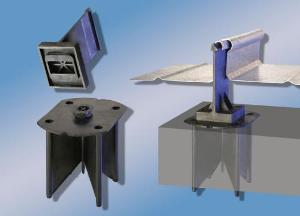The first Ferrari theme park in the world is located in Abu Dhabi, on the island of Yas.
The red-silver aluminum roof (over 200,000 square meters in size) of this unusual structure is secured in place with the aid of mounting brackets made of BASF’s plastic Ultramid®. The world’s largest and most impressive standing-seam metal roof was developed, manufactured and installed by the Interfalz company of Oranienburg.
 The silver-red roof of Ferrari World Abu Dhabi, which is more than 200,000 square meters in size, covers the world's largest indoor amusement park, and consists of formed aluminum panels that are connected by means of “thermoholder” mounting brackets and anchors made of Ultramid® A3WG10 polyamide from BASF.
The silver-red roof of Ferrari World Abu Dhabi, which is more than 200,000 square meters in size, covers the world's largest indoor amusement park, and consists of formed aluminum panels that are connected by means of “thermoholder” mounting brackets and anchors made of Ultramid® A3WG10 polyamide from BASF.
As large as 40 soccer fields, the roof of Ferrari World Abu Dhabi consists of individual aluminum panels that were formed directly from roll stock on-site, seamed during installation and fastened together with the aid of mounting brackets made of the very stiff Ultramid A3WG10, a glass fiber-reinforced polyamide 66 from BASF. The ribbed, “thermoholder” plastic brackets replace their metal predecessors, optimize the sliding friction behavior at the head of the bracket and improve the insulating characteristics of the roof considerably, since they prevent the formation of heat bridges or – more important in hot Abu Dhabi – , cold bridges that compromise the building’s insulation.
The two-part plastic fastener system that Interfalz developed in conjunction with BASF also incorporates an additional function: It secures the aluminum panels to the underlying insulating layer at a defined spacing. This is accomplished with the aid of an adapter plate welded to the “thermoholder” mounting bracket. It engages the head of an anchor that is also made of Ultramid: After the self-tapping Ultramid anchor is pressed into the insulating layer, the mounting bracket is screwed to the head of the anchor. Securing in this manner ensures that the overall structure is stable and rigid, while still providing tolerance compensation during installation and allowing the aluminum panel to move in response to thermal expansion.
“On-site installation requires that the anchor head designed by BASF be very tough, rigid and unbreakable when stepped on: The entire system must be rugged and easy to install by workers at construction sites around the world,” explained Heyung Meyer, Managing Director of Interfalz.
In addition, the plastic fastener is resistant to high temperatures and, with a coefficient of thermal conductivity of ë = 0.37, offers considerably better insulating characteristics than the previously used aluminum (ë value of over 200 W/mK).